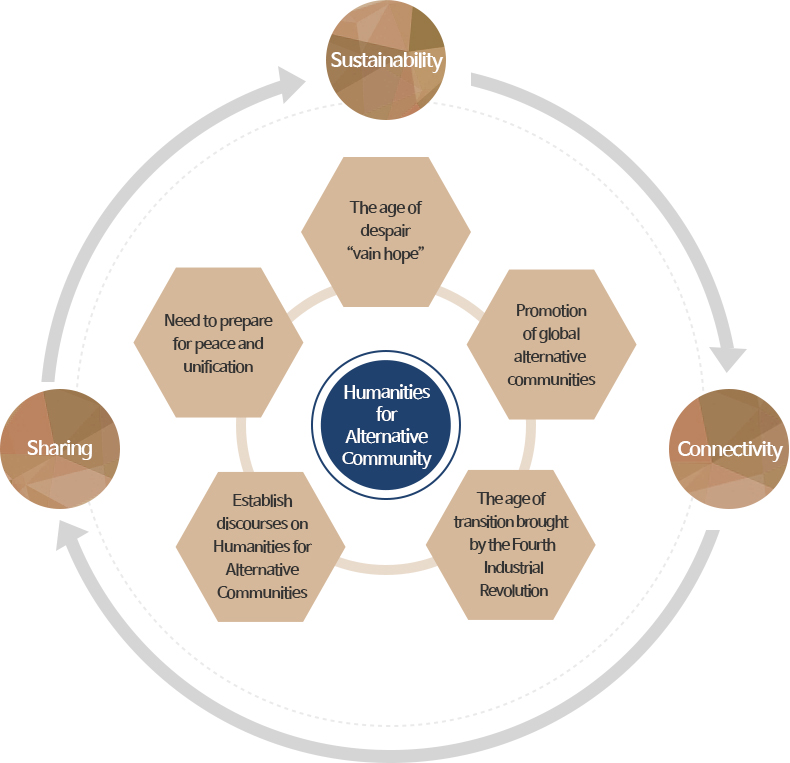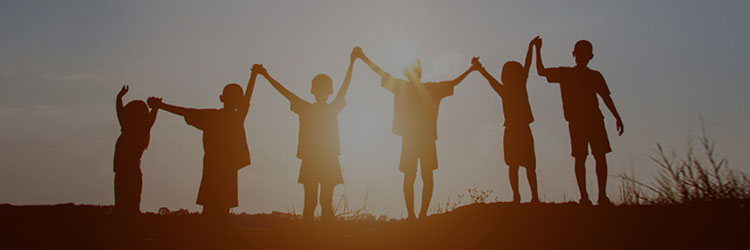연구내용
- Humanities for Alternative Community: Sharing, Connectivity and Sustainable Utopia
-
From some point on, we are feeling uncomfortable about mentioning “hope” or an another way of life. ‘Vain hope’ is the most gloomy and cynical new term among satirical terms recently popular with the younger generation of Korea such as ‘Hell Choseon’ (criticizes the current socioeconomic state of Korea); ‘Huksujeo’ (born with a plastic spoon in one’s mouth)’; ‘Yitaebaek’ (half of the 20s are jobless); or ‘N posedae’ (the generation of people who gave up numerous things). These new terms, which refer to giving up efforts to make changes, expectation for better lives and encouragement towards each other, vividly describe the perception of the reality and pessimism of Korean youths.
How can we explain this endless cynicism, despair and pessimism that the young generation feel about their own lives and reality, after having joined massive candle light rallies, drawing worldwide attention, for a peaceful transfer of political power? Witnessing excessive stress, anger, violence, hatred, and extreme egoism in our society that are revealed in numerous incidents posted in newspapers, how can we preach the principle of hope through humanities so that it can be transformed into an energy in our everyday lives?
To address these issues, we set Humanities for Alternative Community: Sharing, Connectivity and Sustainable Utopia as our research theme.
Concept of research
① Diagnose Korean society’s problems dominated by inequality, conflicts, hatred, discrimination, insecurity, and despair in terms of gender, class, generation, ecology and technology
② Establish an academic and practical framework of Humanities for Alternative Community through examining various community movements worldwide
③ Recommend viable and feasible policies by applying these research results on Korean society

Content of research
Overcome the reality in which we are trapped in a vicious cycle of inequality, conflicts, hatred and discrimination and present sustainable alternative community models and realistic policies that can be implemented.
This research will be conducted in the following two categories:
① Human community : experimentation of alternative community to address socio-cultural discrimination associated with gender, class, and generation
② Community crossing barriers between human and non-human entities : establishment of alterative relations to address various issues arising from the relations between human beings and nature and between human beings and technology
Annual research plans
- * First-year research: analysis and diagnosis of real-world issues: crisis in life and breakup of communities
- In the 2000s, Korean society is confronting myriad of acute social issues including misogyny, gender war, social polarization, income inequality, intergenerational conflict, and family breakup. Moreover, the advent of the Fourth Industrial Revolution and new innovative technologies call for fundamental reorganization of existing principles of the society. The first-year research diagnoses the current status of Korean society that is experiencing crisis and breakup of communities to find out solutions.
| Theme | Main categories | Subthemes | Research content |
|---|---|---|---|
| Crisis in life and breakup of communities | Human communities that fight against discrimination and hatred | gender | Analyze misogyny and gender war |
| class | Analyze income inequality due to polarization and the effects of social discrimination and marginalization | ||
| generation | Analyze conflicts between generations and breakup of families | ||
| Posthuman community where humans and non-humans coexist | technology | Analyze dehumanization and social conflicts in virtual spaces caused by artificial intelligence (AI) | |
| Ecology | Diagnose deepening ecological crisis and the alienation of humans, nature and the world |
- * Second-year research: Alternative discourses and practices – comparative analysis of sustainable communities
- Despite breakup of communities caused by neoliberal globalization, efforts to maintain and restore communities have been made worldwide. In the second year, research will seek sustainable long-term alternatives regarding major issues facing Korean society, and will focus on community movement that occurs in peripheral societies in East Asia, Central America and Northern Europe as well as in core societies in the world of capitalism. Instead of simply referring to cases in other countries, the significance of such overseas cases on Korean society and their humanistic values and prospect will be studied.
| Theme | Main categories | Subthemes | Research contents |
|---|---|---|---|
| Comparative analysis of sustainable communities | Human community that fights against discrimination and hatred | gender | Seek alternative political model for gender equality, not just gender revolution |
| class | Plan sustainable sharing economy and transnational communities | ||
| generation | Present plans to build family communities and local communities with sympathy among generations | ||
| Posthuman community where human and non-human entities coexist | technology | Propose plans to construct post-human community and media neotopia | |
| ecology | Explore a possibility of postmodern natural rights and contemporary appropriation of Taoism |
- * Third-year research: Propose programs and policies - an alternative model for Korean Society
- In the third year, the sustainable community model explored in the second year is presented as a concrete policy option that can be applied to Korean society in the 21st century. Humanities have raised fundamental issues and presented criticism, but been unable to prepare specific solutions to transform the reality. The third-year research will focus on drawing communities that take roots in the real world in Korea but still are based on the imagination of the humanities and on developing concrete programs and feasible policies.
| Theme | Main categories | Subthemes | Research contents |
|---|---|---|---|
| Present alternative models for the Korean society | Human community that fights against discrimination and hatred | gender | Propose a plan to implement basic income guarantee and a model for sharing city |
| class | Propose a plan to implement basic income guarantee and a model for sharing city | ||
| generation | Propose moral community model and ways of intergenerational integration through empathy education | ||
| Posthuman community where human and non-human entities coexist | technology | Conduct posthuman education for the co-evolution of humans and machines and develop policies to enhance digital literacy | |
| ecology | Cyclical sharing economy and sustainable agricultural communities |


